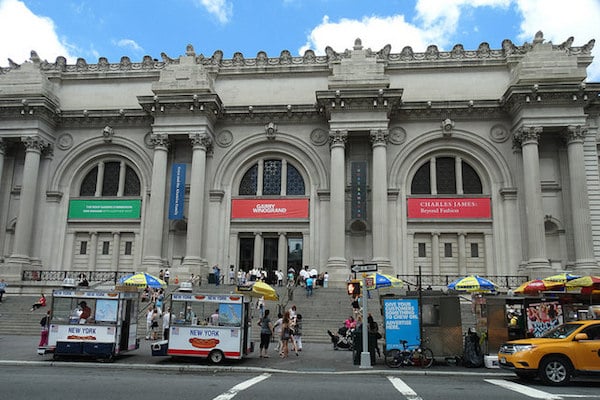
Photo: Robert Easton/Flickr.
City officials have been spying on the food carts outside New York’s Metropolitan Museum of Art for longer than previously thought, according to a report in the New York Times.
Though food carts have been in front of the Met for years, recent complaints from museum officials and neighborhood community boards have prompted the city to crackdown on vendors, who routinely employ so-called “rent-a-vets”—stand-ins for cart operators that, because of their veteran status, allow the operators to be technically compliant with a somewhat obscure 19th-century law permitting disabled veterans to serve food in specific areas of the city without paying the now $300,000-plus annual fee for a license.
“What we have now is a blight on a magnificent new civic space, and a huge impediment, bordering on a safety hazard, for the thousands of people who visit the museum every day,” Harold Holzer, the senior vice president for public affairs at the Metropolitan Museum, told the Times.
The city finally took matters into its own hands last year by launching an undercover investigation into the vendors’ practice that yielded little in the way of evidence incriminating cart operators of anything other than being mildly lazy. As a result, city officials decided there was no consistent way to interpret the law, and the investigation was closed this year without any actions being taken.
This news comes after another report from the Times this September (see “Around the Art World in Three Minutes“) that detailed heavy-handed surveillance tactics along with some less-than artful cozening on the part of Holzer, who claimed the carts left grease stains on a part of the plaza they never inhabited.
For the time being, museum and city officials will have to get used to the sight of vendors, who on busy days number as many as 20, selling $2 hot dogs on a $65 million plaza gifted to the museum this year by hedge fund billionaire and all-around public corruption magnate David Koch (see “Protesters Crash Koch Plaza Opening at the Met“).
“I don’t see it as a terrible thing,” said Howard Dalton, an Army veteran who has operated a cart in the front of the museum of the past three years, in an interview with the Times. “You have to get your workers where you can. It’s the American way.”